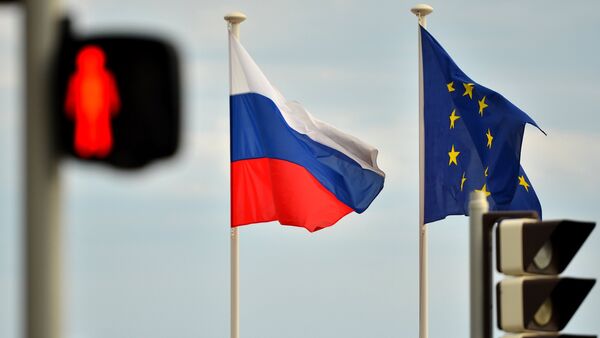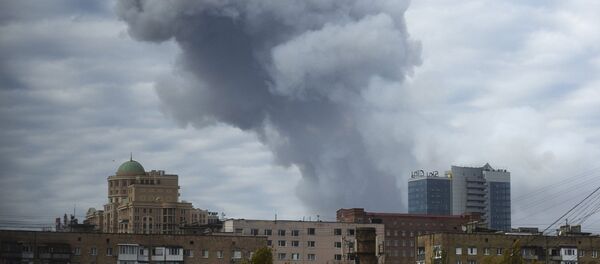WASHINGTON, December 23 (Sputnik) — Washington’s influence on the European Union has shaped the EU policy toward Moscow, making European society more concerned about the role the United States is playing in getting Europe involved with imposing sanctions on Russia, experts told Sputnik.
“There is a growing perception among EU citizens that the European Union is too acquiescent to Washington's demands,” Research Fellow from the University of Ontario, Mahdi Darius Nazemroaya told Sputnik. “They are starting to feel that the United States is pushing the EU to do its dirty work and into confronting Russia.”
An ICM Research poll conducted exclusively for Sputnik showed that 46 percent of European Union citizens say that EU should act independently from the United States.
“The US has in general been more assertive in its response to Russia over the Ukrainian crisis than the Europeans as a whole,” Analyst for geopolitical analysis and forecasting company STRATFOR Eugene Chausovsky told Sputnik.
Chausovsky explained that the United States was “pushing for stronger sanctions against Russia, while the EU was initially more reluctant to implement significant sanctions”.
The poll followed US President Barack Obama’s authorization of the the Ukraine Freedom Support Act which authorizes providing lethal assistance to Ukraine and introduces new sanctions against Russia.
According to the poll, 62 percent of Germans think that Brussels should become more independent from Washington, while 15 percent believe that the EU has already been acting independently enough from the United States. While 38 percent of respondents in France and 39 percent in the United Kingdom agreed that their countries needed to be more independent from the United States. Thirteen percent of residents in both countries said the EU should act less independently from the United States.
The IMC Research poll also showed that 27 percent of European citizens said that the sanctions against Russia had been imposed under Washington’s influence. While another 37 percent of EU residents argued that the European Union and the United States had acted together when imposing anti-Russian sanctions.
Research Fellow from the University of Ontario Mahdi Darius Nazemroaya said that the high perceptions amongst EU citizens who believe that the United States pushed the EU into imposing anti-Russian sanctions was a result of interactions within the business community, between EU citizens and government entities and “certain other sectors where EU citizens are sensing that there is US pressure behind the scenes”.
However, Director General Thanos Dokos of ELIAMEP, a Greek foreign policy think tank says that other factors rather than US influence have also helped to shape the EU’s policy toward Russia.
“US influence has been one of the factors shaping European policy towards Russia, but it was hardly the only or the main influence,” Dokos told Sputnik, adding that other factors included Crimea’s reunification with Russia and the MH17 crash in eastern Ukraine.
Over the past months, the relations between Russia and the West have deteriorated.
The United States, the European Union and their allies imposed several rounds of sanctions against Russia over Moscow’s alleged role in the Ukrainian crisis. The sanctions target Russia’s banking, energy and defense sectors, as well as certain individuals.
On Friday, President Obama issued an executive order imposing new restrictions on investment and trade with Crimea and introduced new sanctions against certain individuals operating in the region.



